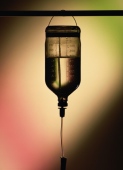
TUESDAY, March 22 (HealthDay News) — The serious and sometimes deadly risk that hospitalized traumatic brain injury patients will develop pneumonia can be reduced by pre-treatment with the steroid hydrocortisone, new French research suggests.
Pneumonia is a looming threat for trauma patients. In fact, “the overall rate of post-traumatic pneumonia reaches an incidence of 40 percent to 60 percent, mainly in patients with traumatic brain injury,” the study authors noted in the report published in the March 23/30 issue of the Journal of the American Medical Association.
“Early post-traumatic pneumonia increases the duration of mechanical ventilation, hospitalization and risk of death. Thus, prevention of post-trauma pneumonia is a major clinical and economical issue,” according to background information in the study.
“Both experimental and clinical data suggest that corticosteroid use may decrease the occurrence and severity of [hospital-acquired] pneumonia in patients treated in intensive care units (ICUs),” the team, led by Dr. Antoine Roquilly of the University of Nantes in France, wrote in the report.
To gauge the potential protective impact of hydrocortisone, the team focused on 150 severe brain trauma patients who were being treated in one of seven French “level 1” ICU trauma centers between 2006 and 2009.
Some patients were randomly selected to receive an intravenous drip of 200 milligrams (mg) a day of hydrocortisone for five days, 100 mg on the sixth day and 50 mg on the seventh day. Patients who were not placed on the hydrocortisone regimen were given a sugar pill (placebo).
The results: While more than 51 percent of the placebo patients ultimately developed pneumonia by the 28th day in the hospital, that figure dropped to under 36 percent among patients on the steroid regimen.
When looking solely at patients found to have an insufficient amount of naturally produced corticosteroid in their body, the breakdown of risk was similar: More than 54 percent of the placebo patients developed pneumonia, but the same was true for less than 36 percent of the hydrocortisone-treated patients.
Although the overall risk of death was comparable between the two groups, those in the steroid group had less need for mechanical ventilation assistance, less overall time in an ICU, and a lower risk of developing either acute lung injury or acute respiratory distress syndrome. In addition, none of the hydrocortisone patients developed a low concentration of blood sodium (“hyponatremia”), but more than 9 percent of the placebo group did, according to the study.
For his part, Dr. Lisandro Irizarry, chair of the emergency department and emergency training program at the Brooklyn Hospital Center in New York City, described the study as “interesting,” and suggested that if it holds up upon further research it could become “part of the standardized care.”
In fact, “it’s already not uncommon for patients who have had major trauma such as brain injury to be given a level of steroids. Because anybody who sustains significant trauma may have compromised protective mechanisms for their airways, as a result of not having the normal capacity to engage in routine oral hygiene, routine coughing, routine expectorating of phlegm. This means a greater amount of bacteria can reach down and raise the risk for pneumonia,” he noted.
“Now when a body undergoes a major stress, such as trauma, there are certain key hormones in the body that are called upon to assist in healing, such as hydrocortisone,” Irizarry explained. “But in fact this process can be impaired by trauma. So the idea here is to give a patient an external supplement of steroid for a short period of time to augment their body’s own healing response, because it gives the body a maximal stress hormone load-up at the beginning of the trauma healing. So this certainly makes sense,” according to Irizarry, who was not involved with the new study.
However, an editorial accompanying the study, written by Drs. Eileen M. Bulger and Joseph Cuschieri, of the University of Washington in Seattle, struck a more hesitant note.
While describing study as “well-designed,” the editorialists cautioned that the number of traumatic brain injury patients involved wasn’t large enough to be able to draw any firm conclusions about the promise of steroids in terms of preventing pneumonia-related death.
More information
For more on traumatic brain injury, visit the U.S. National Institute of Neurological Disorders and Stroke.

